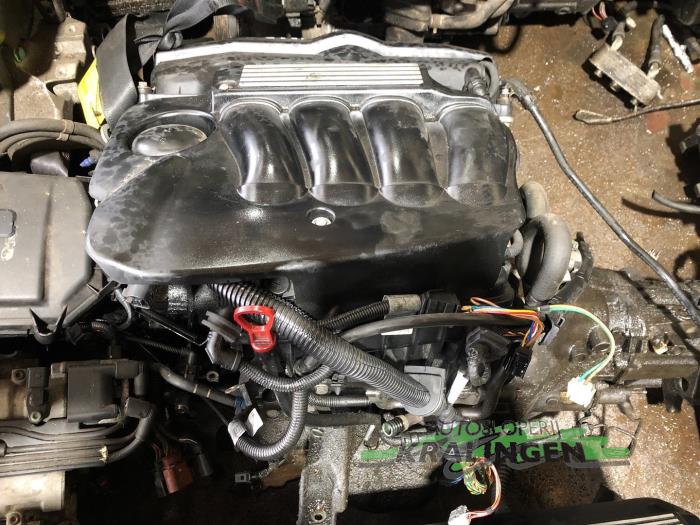BMW 318ti: Performance Specifications and Qualities Explained
BMW 318ti: Performance Specifications and Qualities Explained
Blog Article
Vital Factors To Consider for Selecting the very best Engine for Your Needs
In the realm of choosing the optimal engine to meet your requirements, numerous vital factors need careful factor to consider to guarantee optimal efficiency and performance. From the nuanced balance between power and performance to the often-overlooked aspects of upkeep and solution requirements, each element plays a critical duty in determining the most suitable engine for your particular demands. As the complexity of engine modern technologies remains to advance, discerning the most fitting choice demands a deep understanding of the interaction between various factors to consider. By exploring the intricate web of aspects that underpin this decision-making process, a clearer path emerges in the direction of selecting an engine that not only fulfills but exceeds your assumptions.
Power and Performance
When reviewing engines for optimum performance, it is essential to prioritize both power output and efficiency. Power outcome determines the capacity of an engine to create energy, which directly impacts its efficiency. A high power outcome is important for demanding jobs such as high-speed demands or durable applications. It ensures that the engine can deal with the work successfully and efficiently. However, power alone is not adequate; efficiency plays a significant duty in figuring out the general efficiency of an engine. Effectiveness describes exactly how well the engine converts gas into usable energy. A more reliable engine will deliver much better mileage, reduced exhausts, and minimized operating expense. Striking the best equilibrium between power output and efficiency is key to picking an engine that meets your particular needs. When making this decision, it is vital to think about elements such as the meant usage of the engine, ecological influence, and long-term price effects. By carefully reviewing both power and performance, you can pick an engine that supplies ideal performance and satisfies your needs efficiently.
Fuel Performance and Economic Situation
In the realm of engine choice, the consideration of fuel performance and economic situation holds extremely important value. Fuel efficiency describes the engine's capacity to transform gas right into energy with minimal waste, directly affecting operating expenses and environmental sustainability. bmw 318ti. When picking an engine, reviewing its gas economy is essential to figure out long-lasting savings and ecological impact. Engines with higher gas effectiveness not only minimize fuel expenses yet also reduce carbon emissions, adding to a greener operation.
Compatibility and Application
Thinking about the gas efficiency and click this link economic climate of an engine, the next essential aspect to address is its compatibility and application within specific functional contexts. Compatibility refers to how well the engine incorporates with the general system or tools it powers.
Furthermore, the application of the engine is similarly essential. Different engines are designed for particular objectives, whether it be commercial machinery, aquatic vessels, vehicles, or power generators. Comprehending the desired application enables the choice of an engine that can deliver the needed power outcome, torque, and operational features. A high-revving engine developed for efficiency cars would not be appropriate for durable building and construction equipment that needs high torque at reduced speeds.
Maintenance and Solution Demands
Upkeep and solution requirements play a critical function in ensuring the durability and optimum efficiency of an engine. Normal upkeep is vital to avoid failures, expand the life-span of the engine, and maintain its performance. When choosing an engine, it is very important to think about the maker's recommended upkeep timetable and the availability of service facilities or certified technicians.
Factors such as the regularity of oil changes, filter replacements, and total examinations can dramatically affect the engine's performance. Some engines may require more frequent maintenance based on learn the facts here now their design and use, while others may have longer periods between maintenance checks. It is sites vital to stick to these service requirements to prevent expensive fixings and unexpected downtime.

Expense and Budget Factors To Consider
Budget plan restrictions usually play a considerable duty in the decision-making process when choosing an engine for a specific application. When thinking about the cost and budget plan ramifications of choosing an engine, it is important to assess not only the preliminary acquisition cost but likewise the long-lasting costs connected with maintenance, fuel intake, and potential upgrades or repair work. It is vital to strike a balance between the in advance expense of the engine and its overall lifecycle costs to guarantee that the selected engine stays economically lasting throughout its operational life-span.
Factors such as fuel sturdiness, performance, and dependability can directly impact the total expense of possession of an engine. While an extra expensive engine may have higher ahead of time prices, it can potentially result in reduced maintenance and fuel expenditures over time, hence offering much better worth in the long run.
Final Thought

Gas effectiveness refers to the engine's capacity to convert gas right into power with very little waste, straight affecting operating costs and ecological sustainability.Elements influencing fuel efficiency include engine style, burning efficiency, and total efficiency optimization. Additionally, selecting the ideal gas kind and grade as suggested by the engine supplier can even more improve effectiveness and extend engine lifespan.
Engines with good service attributes and readily offered components can decrease maintenance expenses and minimize the time the engine is out of procedure - bmw 318ti. It is essential to strike a balance between the ahead of time cost of the engine and its general lifecycle prices to make sure that the chosen engine remains financially sustainable throughout its operational lifespan
Report this page